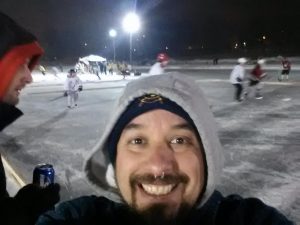Members of the MGHA are more than just a bunch of people getting together to play hockey. They are a family. I was afraid to join at first, but through reassurance from Patrick and a few friends, I went for it. What I found was much more than I had anticipated. I found acceptance, inclusion, and true loving friendships.
I have always had a hard time fitting in and making friends. But from day one of the clinics, I have never found it easier. People come up to me who already know me even though I don’t know them. I always say hi back and then wonder how they know who I am. I am a trans-man, which can make it difficult for people to accept you, whether you outed yourself or others did so for you. This league has helped me have confidence in knowing I am a real man daily.
I have realized in this league that when you give your all, it’s noticed. It also means people love to include you. I’ve never had a more active social life, but not only that, I know that no matter what, these people will ALWAYS have my back. We all come from different walks of life, yet we still come together every week, and occasionally more often. The only place where I really know who I am is out on the ice with these awesome, crazy, fun-loving people.
True friendship is a very hard thing to find these days. With the majority of people so worried about themselves, the little things are often overlooked. But I have had my new friends drop off food when I’m sick and check on me if they haven’t heard from me, and I have been invited to things like Badger hockey games, just because they know I’d love going.
I hope that anyone who has ever thought about joining and was too afraid to do so will read this and realize there’s no need to be afraid. This league will love you no matter who you are.

